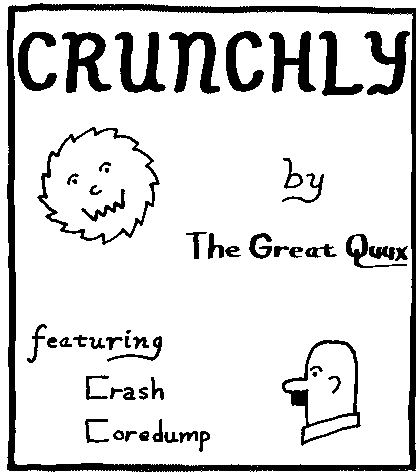What’s a quux?
quux, noun:
-
Originally, a meta-word like FOO. This word was coined by Guy Steele for precisely this purpose when he was young and naive and not yet interacting with the real hacker community. Had he known that “foo” was the standard, he would not have bothered. Many people invent such silly words; this one seems simply to have been lucky enough to have spread a little. In an eloquent display of poetic justice, it has returned to the originator in the form of a nickname as punishment for inventing this BLETCHEROUS word in the first place.
- The Jargon File 1.5.0 by Guy Steele et al, 1983
-
The Great Quux was the pseudonym of Guy Steele as he wrote the the Crunchly cartoons in 1973. 1.
 (Image Copyright 1973 Guy Steele; licensed under the CC BY-NC-ND 4.0).
(Image Copyright 1973 Guy Steele; licensed under the CC BY-NC-ND 4.0).
quux.org
I registered quux.org in 2000 when I started getting interested in the ways old (and often forgotten) technology could still have a lot of contemporary value. It wound up hosting my Gopher site to begin with, thinking “if I’m going to host some obscure old technology here, why not do so with an obscure old name?”
quux.org is hosted on the same machine as complete.org, and so the decision of which DNS zone to use for which service is purely arbitrary. In general, I have put things roughly web-related under complete.org and everything else under quux.
Links to this note
Usenet, of course, originally ran over UUCP in quite a few cases. Since NNCP is quite similar to UUCP – in fact, you can map UUCP commands to NNCP ones – it is quite possible, and not all that hard, to run Usenet over NNCP. In fact, in a number of ways, it works better than Usenet over UUCP!
At quux.org, I operate a heavily-peered Usenet server. It peers with others on the Internet using conventional NNTP. Moreover, I also offer partial and full Usenet over NNCP feeds. quux.org carries a full set of text newsgroups, and no binaries.
I am a programmer, manager, hobbyist, advocate, volunteer, dad, and nature lover. I live out on an old farmstead in rural Kansas that once belonged to my grandparents. The nearest paved road is about 3 miles away, and the nearest town (population 600) is 7 miles away. I have three incredible children, which I might occasionally mention on my blog.
Complete.Org is a personal project managed since 1994 by John Goerzen.
These sites are hosted on the complete.org server. Some are hosted with resources donated to non-profit organizations.
According to the NNCP documentation, NNCP is intended to help build up small size ad-hoc friend-to-friend (F2F) statically routed darknet delay-tolerant networks for fire-and-forget secure reliable files, file requests, Internet Email and commands transmission. All packets are integrity checked, end-to-end Encrypted, explicitly authenticated by known participants public keys. Onion encryption is applied to relayed packets. Each node acts both as a client and server, can use push and poll behaviour model. Also there is multicasting area support.